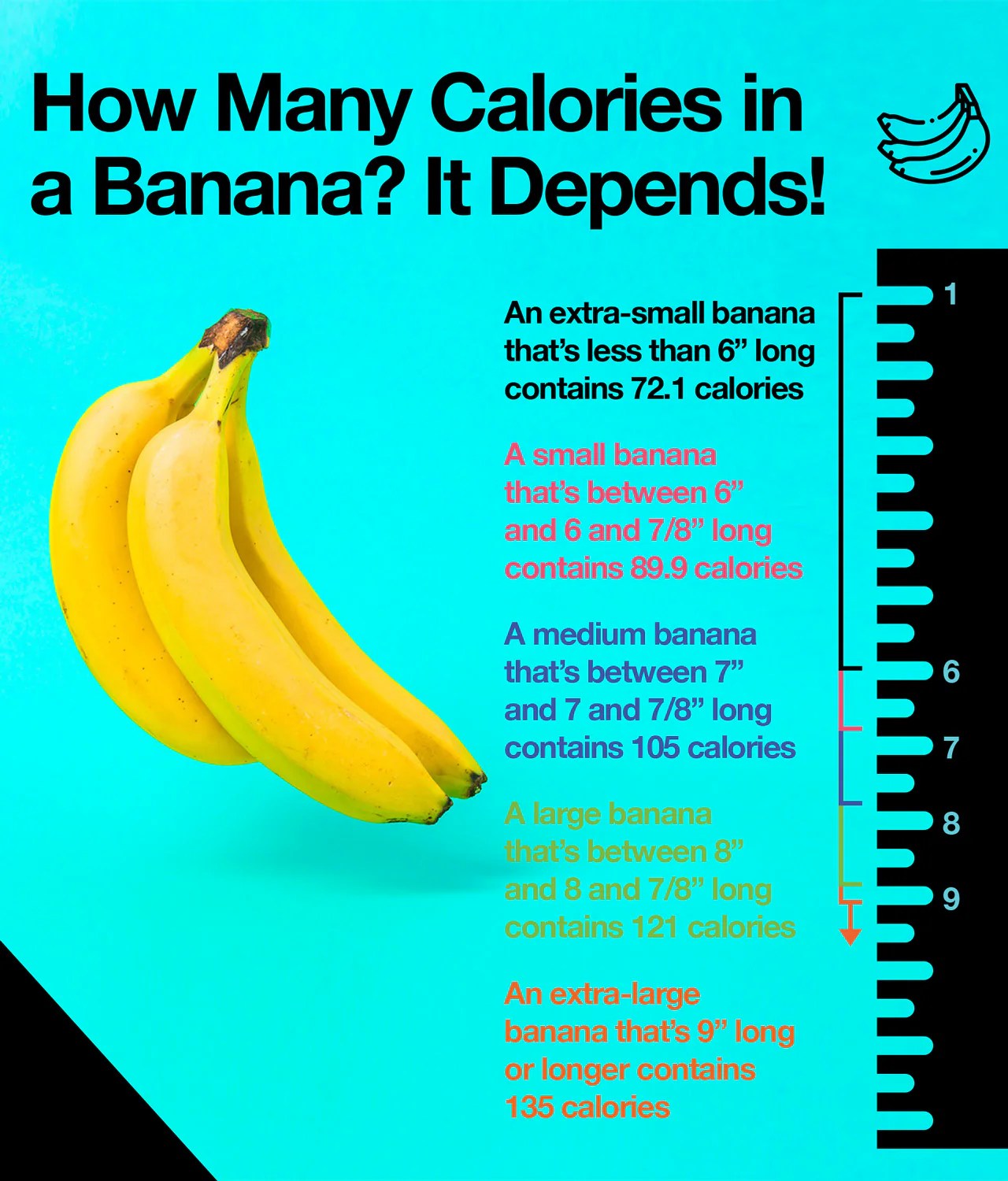A medium banana (approximately 118 grams) contains about 105 calories. This guide provides a detailed breakdown of banana calorie content by size, along with key nutritional information and tips for incorporating this versatile fruit into a healthy diet.
Calories in a Banana: A Quick Look
A banana’s calorie count varies based on its size. Here’s a quick reference:
| Size | Length (inches) | Approximate Weight (grams) | Approximate Calories |
|---|---|---|---|
| Extra Small | Under 6 | ~81 | 72 |
| Small | 6-7 | ~101 | 90 |
| Medium | 7-8 | ~118 | 105 |
| Large | 8-9 | ~136 | 121 |
[Visual of bananas of different sizes labeled with calorie counts would go here]
Banana Nutrition: More Than Just Calories
While calorie content is important, it’s crucial to understand a banana’s complete nutritional profile. Beyond calories, bananas provide vital nutrients:
- Carbohydrates: The primary source of calories in a banana. A medium banana contains about 27 grams of carbs.
- Sugar: Naturally occurring sugars make up about 14 grams of the carbohydrates in a medium banana, providing quick energy.
- Fiber: A medium banana contains around 3 grams of fiber, supporting digestive health and promoting satiety.
- Protein: Bananas offer a small amount of protein, about 1 gram per medium fruit.
- Fat: Bananas are very low in fat, containing less than 0.5 grams per medium serving.
[Nutritional information chart would go here]
Ripeness and Calories: Does it Matter?
As a banana ripens, its starch converts to sugar, making it taste sweeter. This process doesn’t significantly affect the total calorie count, though it might very slightly increase sugar content. A greener banana, higher in resistant starch, is particularly beneficial for gut health. A ripe banana, higher in sugars, provides quick energy. Current research suggests this shift in carbohydrate composition has minimal impact on overall calories.
Health Benefits of Bananas
Bananas offer a range of health benefits beyond their calorie content:
- Potassium: Essential for blood pressure regulation and muscle function.
- Fiber: Promotes digestive regularity and helps manage cholesterol levels.
- Vitamin B6: Supports brain health and immune function.
- Vitamin C: A potent antioxidant.
Incorporating Bananas into a Healthy Diet
Bananas are incredibly versatile:
- Snack: Enjoy a banana on its own for a quick and nutritious boost.
- Breakfast: Add sliced bananas to cereal, yogurt, or oatmeal.
- Smoothies: Blend bananas into smoothies for added creaminess and nutrients.
- Baking: Use mashed bananas as a natural sweetener in baked goods.
- Frozen Treat: Freeze banana slices for a refreshing snack.
Glycemic Index and Load: A Deeper Dive (Optional)
Bananas have a moderate glycemic index (GI), meaning they don’t cause rapid spikes in blood sugar. Their glycemic load (GL) is relatively low, further supporting their suitability for those watching their blood sugar. However, the GI of a banana can increase with ripeness. It’s important to remember that individual responses to food can vary.
Banana Varieties: Exploring the Spectrum (Optional)
While the Cavendish is the most common variety, numerous others exist, like the smaller Lady Finger or the starchy Plantain, often cooked before eating. While nutritional profiles are generally similar, subtle variations may exist. Ongoing research explores these differences.
Banana FAQs: Addressing Common Concerns (Optional)
Are bananas fattening? No. As part of a balanced diet, bananas contribute valuable nutrients and can support weight management due to their fiber content, which promotes fullness and may help prevent overeating.
Indulge your curiosity about the nutritional content of other popular foods, like Olive Garden breadsticks or the refreshing Vanilla Bean Coolatta.
- Borosilicate Glass Containers Offer Superior Food Storage and Meal Prep - January 20, 2026
- Glass Lid Storage Containers Keep Food Fresh and Safe - January 19, 2026
- Borosilicate Glass Storage Delivers Durability and Safety for Meals - January 18, 2026










